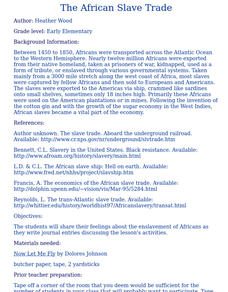Curated OER
COTTON AND SLAVERY IN ARKANSAS
Fifth graders read about the cotton industry in America and demonstrate the roll of slaves picking and removing seeds from a boll of cotton. The relationship between slaves and cotton production is established.
Curated OER
Slavery During the Nineteenth Century
Young scholars research the life and daily activities of a slave during the nineteenth century. They write an essay role playing a slave during this time period.
Curated OER
SLAVERY IN ARKANSAS, THE LIFE OF A SLAVE
Learners participate in a variety of activities to demonstrate an understanding of mid 1800 role of slaves. Vocabulary, writing and math are integrated into the lesson.
National Endowment for the Humanities
From Courage to Freedom: The Reality behind the Song
Learners study how Frederick Douglass uses language to describe a realistic picture of slavery in his writings which are primary source documents. They examine his use of word choice, imagery, irony, and rhetorical appeals and use slave...
American Chemical Society
Norbert Rillieux, Thermodynamics and Chemical Engineering
The man who invented the earliest examples of chemical engineering was an American-born, French-educated, free man of color before the Civil War, and went on to translate Egyptian hieroglyphics. There is something of interest for almost...
Curated OER
American Colonization Society Lesson Plan
Students read an article online "Colonization and Emigration" and break into debating groups. They research points that support their side, namely whether or not the American Colonization Society was for or against segregation. They...
Curated OER
Denmark Vesey's Rebellion
Young scholars research the slave, Denmark Vesey, and create a dramatic play depicting his life.
Curated OER
The Civil War 1850–1865
For this online interactive history worksheet, students respond to 10 short answer questions about the American Civil War. Students may check some of their answers on the interactive worksheet.
Curated OER
Slave Auctions in South Carolina
Young scholars examine primary sources in the form of auction records, create frequency charts, graphs and diagrams that they analyze to anwer questions followed by the writing of a paper that demonstrates their comprehension of the lesson.
Curated OER
Fredrick Douglass...A Digital History
Seventh graders research the life of Fredrick Douglass. In this Fredrick Douglass lesson, 7th graders read about his life and discuss it. They write poetry describing his experience as a slave and create their own monument for Fredrick...
Curated OER
From Slave to Entrepreneur: The Life and Times of William Ellison
Eighth graders interpret historical evidence presented in primary and secondary resources. In this South Carolina history lesson, 8th graders examine sources that require them to examine the life of William Ellison, a black slave owner.
Curated OER
Gullah People of the Sea Islands
Students examine the history and culture of the Gullah people. They study the geography, impact of industrialization and effects of tourism on the people of Gullah. They view films, use a large map of West Africa,. Students will listen...
Curated OER
Of Human Bondage
How does the particular point of view in a situation affect the way it is presented? Focusing on perspectives on slavery during the Civil War, middle schoolers use research to write narratives from the points of view of their historical...
Thomas Jefferson Foundation
Personal Morals vs. Political Moves
Was Thomas Jefferson a hypocrite? That is the question facing class members as they examine excerpts from documents that relate to Jefferson's beliefs about slaves and slavery.
K12 Reader
Finding Text Evidence: Frederick Douglass
After reading a very brief excerpt from Frederick Douglass' autobiography, learners cite textual evidence to support a main idea of the primary source about Douglass' humiliating experience with slavery. This is a brief exercise that...
Curated OER
Carolina Gold and the Gullah
Eighth graders investigate the physical geography of South Carolina to explore how it was suited for growing rice. They examine how slave labor contributed to a plantations success and compare Gullah culture from now to the past.
Curated OER
Road to War Assessment
In this American Civil War worksheet, students respond to 20 short answer, multiple choice, and true or false questions about the events that led to the outbreak of war.
Curated OER
Daily Lives of Slaves - What Really Happened?
Students explore the varieties of slave life in antebellum America. They research various sources to examine the relationships between masters, overseers, and plantation hands. Students identify and describe the conflicts between...
Curated OER
MANY REASONS TO LEAVE
Students research different economic, cultural, and social characteristics of slavery after 1800, how slavery hindered the emergence of capitalist institutions and values, and slavery both prior to and after the Civil War.
Curated OER
Slaves on a Tobacco Plantation
In this worksheet about slaves on a tobacco plantation, students look at a picture and "talk about it;" how did slaves get to the New World, what type of work did they do, why is slavery wrong and how would it feel to be a slave? No...
Curated OER
African Americans After the Civil War
Young historians learn what life was like in the South during the Reconstruction era. They complete hands-on-activities and participate in group discussion to understand how experiences varied between African Americans and white...
Curated OER
Three Coffles Lesson Plan
Students read about the slave trade in primary source documents. They discuss differences and commonalities in experiences. They write prose or poetry from the point of view of one of the figures from the reading and create a triptych.
Curated OER
Underground Railroad Role Play
Students experience what the Underground Railroad was really like by role-playing as escaping slaves. They must travel to the North Star until they cross an imaginary line into Canada.
Curated OER
The African Slave Trade
Students share their feelings about the enslavement of Africans as they write journal entries discussing their role play activity.

























